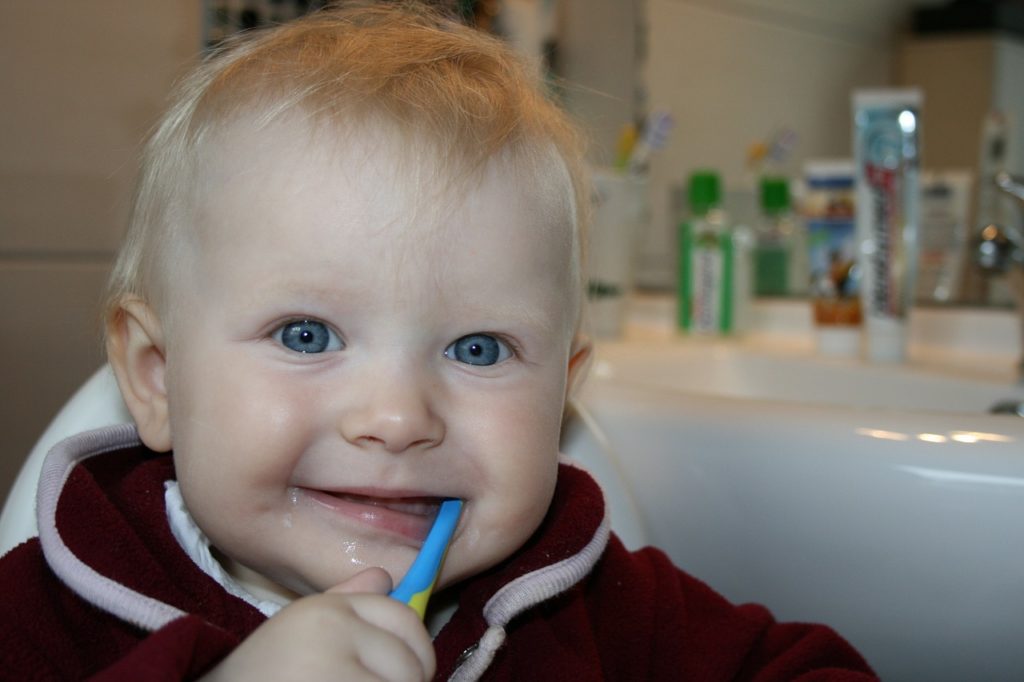Although your baby’s teeth are temporary, keeping them clean and healthy is important. As soon as they appear, usually around six months of age, baby teeth are susceptible to decay. Referred to as Baby Bottle Tooth Decay or Early Childhood Caries, early cavities affect the ability to chew and speak and may keep adult teeth from coming in correctly. Decay occurs when acid from sugar in fruits and vegetables forms on the teeth and damages the enamel. Therefore, it is so important to keep your baby’s teeth healthy. With the proper care, your child, by the age of three, should have a full set of 20 teeth, strong jaws that make room for permanent teeth, and good habits that will last a lifetime.
Cleaning Your Child’s Teeth
Good oral hygiene begins as soon as your child is born. You can start by gently wiping your baby’s gums with a sterile washcloth or moist gauze pad during the first days after birth. Around six months, you will see teeth pushing through the gums, although this may naturally occur later in some children. When this happens, brush your toddler’s teeth twice a day, or as directed by professionals, with a child-sized toothbrush and a tiny drop of fluoride toothpaste. As soon as the child has two teeth that touch, clean between the teeth daily.
Toddlers between the ages of three and six can brush their own teeth, but close supervision is needed to make sure the teeth are clean, no toothpaste is ingested, and the proper amount of paste is used.
Teething
Teething, like walking and talking, is a ritual celebrated by cultures around the world. You will likely see this process begin between the third and sixth month when the front teeth erupt, often causing symptoms of irritability, drooling, loss of appetite, or sleeplessness. One by one, teeth will push their way through the gums until there is a full set of 20, usually around the age of three. In some cases, however, the first teeth may not appear for 12 to 14 months, a process sometimes influenced by heredity. While some discomfort during teething is normal, signs of diarrhea, fever, or rash are not. If these occur, consult a medical professional.
First Dental Visit
The American Dental Association recommends a dental visit within six months, and no later than one year, after your baby’s first tooth appears. An early visit to the dentist helps to prevent future problems and teach healthy habits. During the first consultation, the dentist will examine your child’s mouth to see that it is developing properly, discuss risks of tooth decay or thumb sucking, clean the teeth, and give you tips for daily care. Future treatments and appointments are usually arranged at this time.
This visit is also an opportunity to give your dentist a friendly face. You can help by following a few simple steps: Schedule your child’s appointment during a time of the day when he is not tired or hungry. Be positive. If you are anxious, your child will sense your feelings and feel less confident, as a result. Never bribe your child or use dental visits as a threat or punishment. You want trips to the dentist to be a pleasant experience in the future.
Fluoride
Fluoride is a mineral found in all sources of water, including oceans, lakes, and rivers, in varying amounts. It is also added to some kinds of toothpaste and mouthwash, as well as to tap water, to fight tooth decay. Because fluoride makes teeth more resistant to cavities and repairs weakened enamel, young children who do not get an adequate supply of fluoride may have an increased risk for dental problems. If you are not sure of the fluoride content in the bottled or tap water your child drinks, contact your state or local health department or water supplier for more information. Your dentist or pediatrician may recommend a fluoride supplement if you live in a community where fluoride is not added to drinking water.
Pacifiers and Thumbs
Sucking is a normal and comforting part of your child’s development. It is so soothing, though, that it may lead to problems when it is no longer necessary for feeding and is used only for self-comfort. Infants and young children often become attached to thumbs, fingers or pacifiers, and caregivers may rely on these methods for calming. Especially when dipped in sugar, honey, juice, or other substances that harbor germs, pacifiers promote cavities. There is also a connection between pacifiers and middle ear infections.
The American Dental Association says that most children give up a thumb or pacifier by the age of four. Those who continue past the age of five not only risk tooth decay, but they also may have misaligned jaws, mouth sores, or misfitting teeth.
Get in touch
The Austin Orthodontist practice of Dr. RJ Jackson invites you to schedule a free initial consultation at our Steiner Ranch Orthodontist location. We will conduct a thorough evaluation and provide you or your child with the best course of orthodontic treatment. Call us today at (512) 363-5792.


